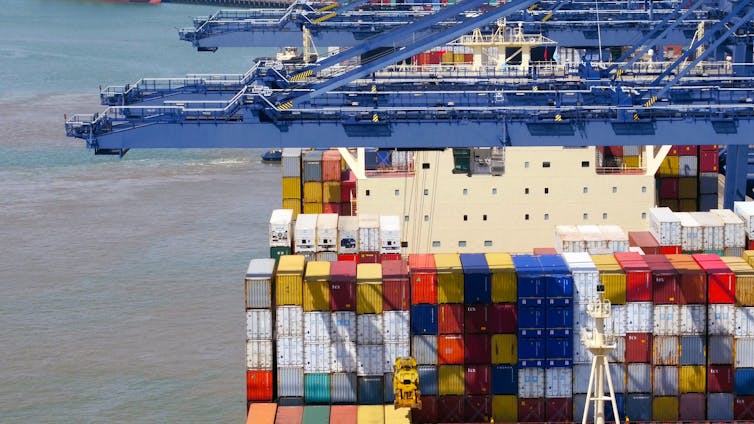A No-Deal Brexit Could Put Nearly 20% Of British Jobs At Risk And Disproportionately Hurt Weaker Regions
A meaningful vote on whether to rule out a no-deal Brexit could take place as late as March 12, less than three weeks before the UK is due to leave the EU, with or without a deal - and the clock is ticking down. Parliament needs to avoid a hard Brexit to protect industry and to make sure that Brexit doesn't disproportionately hurt weaker regions of the UK.

That's a key finding from our latest research, just published in the journal Contemporary Social Science, which outlines how reliant the UK economy is on inward investment and how a no-deal Brexit will see that investment (and the jobs that come with it) dry up. But, whatever happens with Brexit, the UK must develop a more regional industrial strategy to bring better jobs and productivity to the country as a whole.
The UK economy relies more on foreign investment than any other G7 country. Investment into the UK has driven demand for skilled jobs such as technicians, engineers and IT specialists. UK businesses that were foreign-owned and received investment from overseas employed four million people in 2016 - some 17% of all UK employees. Half of those were employed by EU-owned firms.
A key point to note is that leaving the single market could put these good-quality jobs at risk, forcing more UK workers into "bad jobs" including zero-hours contracts, which require few skills and little room for progression.
Above all, the government needs to avoid a hard Brexit that involves the return of tariff barriers. Ideally, it should secure a trade deal as soon as possible, which prioritises access to the single market for as many sectors.

A no-deal Brexit will slow down trade and investment. Steve Parsons/PA Wire/PA Images
Leaving the single market would make it more difficult for European businesses to invest in the UK economy, putting almost 20% of current jobs at risk - including many of the UK's relatively "good jobs" that require training, are higher paid and have permanent contracts. There is also a danger that the UK's weaker regions will be disproportionately hurt by Brexit, a point which tallies with other research into the regional impact of Brexit.
It's doubtful that the £1.6 billion Stronger Towns Fund, just announced by the government, would go anywhere near compensating for this.
Deep connections with EU suppliers
Brexit uncertainty has also been a major factor reducing investment in the UK auto industry, for example, which has seen investment effectively stall.
Indeed, the auto industry has of late seen a wave of bad news. In the space of just a few weeks Nissan reversed its 2016 decision to assemble the XTrail SUV at Sunderland, citing Brexit as a factor, Ford said it was looking at alternative options to the UK for engine production in case of no deal, and Jaguar Land Rover announced 4,500 job losses. That's even before Honda's shock announcement that it will close its Swindon plant from 2021.
A big issue for UK auto and much of UK manufacturing more broadly is how deeply interconnected it is with the EU through supply chains and Just-in-Time delivery.
For example, BMW assembles engines at its Hams Hall plant near Birmingham, but the engine blocks come in from France and may go to Germany for further work before being assembled.
The engine may go into a Mini assembled at Oxford or the Netherlands, or into a BMW assembled in Germany. Components, engines, and the final car could cross the channel numerous times and the assembled car could be sold anywhere in Europe or further afield. Even short hold-ups at the border will likely make Britain a less competitive place to build cars.
Even a softer Brexit could cut inward investment to the UK through customs delays and currency depreciation.
Any attempt to make the UK labour market more flexible to remain cost-competitive after Brexit will be of limited value as the UK is already one of the most flexible in the developed world. Further deregulation risks entering a "race to the bottom" where standards keep getting lowered in a bid to save costs.
Regions will have to focus on job quality, rather than just the number of jobs created. It should be noted that there isn't a trade-off between creating jobs and job quality. In this sense, more and better jobs are compatible.
Redesigning a regional industrial policy
In our paper, we conclude by outlining some design principles for a new regional industrial strategy which we feel are key, whatever the post-Brexit landscape looks like. These emphasise the importance of attracting investment that specifically benefits the region in question. Technological investment is important, but so are jobs. It's also important to consider how different parts of the country can carve out their own niches in certain industries. Plus, if free trade with the EU is going to be limited, then investment must not rely on this.
The regional dimension to a new industrial policy is key here and further devolution and decentralisation will be an imperative. Strengthening local capacity will be critical. This could involve the creation of development bodies that can intervene more widely and strategically at a regional level than currently exist.
That's especially important given that the government's much lauded industrial strategy never really connected its policies towards sectors and technologies with where they were located. Given the challenges noted above, that needs to change post-Brexit.
This article is republished from The Conversation under a Creative Commons license. Read the original article.
This article is republished from
The Conversation under a Creative Commons license.



